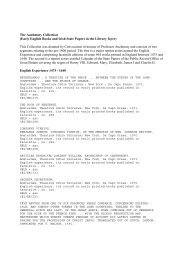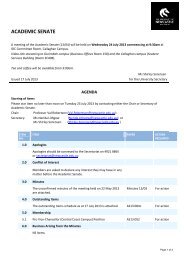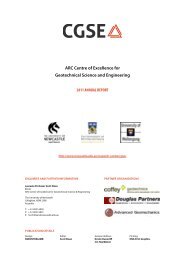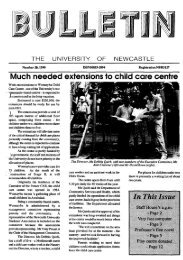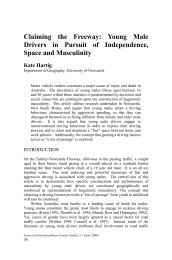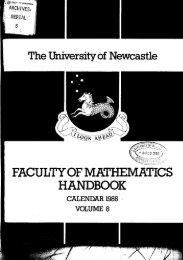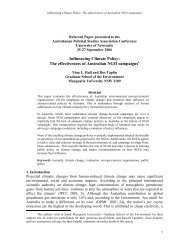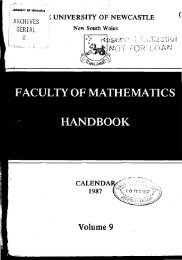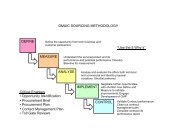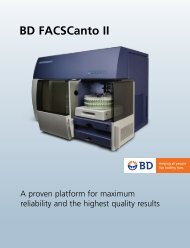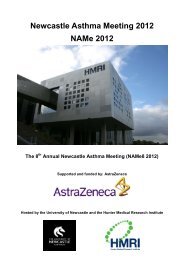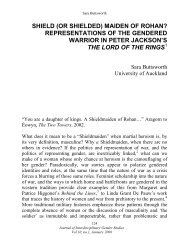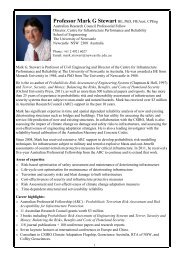n - University of Newcastle
n - University of Newcastle
n - University of Newcastle
Create successful ePaper yourself
Turn your PDF publications into a flip-book with our unique Google optimized e-Paper software.
98 All ATSTBALIAN LANGUAGE. . TIlE KEY. 99<br />
hence the variety <strong>of</strong> the forms <strong>of</strong> verbs ' to be ' ; for instance<br />
13. -r-illi-ko; m., for instrurr~entality to bc in some act.<br />
natkn bag means 'I see'; na korien bag, 'I see not'<br />
nakulla bag, 'I saw'; na pa korien ba.g, 'I saw not.' This<br />
last cannot be written n a lr u 11 a k or i e n b a g, 'I saw not,'<br />
because the -k u 11 a mould affirm that the agent actually <strong>of</strong> his<br />
own power did whatsoever the root affirms ; and &he root-form n a<br />
n ~pkl&griniln ma1 bara bon, gatun tetti n~al<br />
n, 'and they shall scourge him and put; him to<br />
Anal.-Gatun, 'and'; w Blkorinfin, 'will instrumentally male'<br />
him. The wB1 is from the English word wale, 'a mark in the<br />
implies that the thing is actually seen, while the - k u 11 a added flesh'; - k o is the usual affix <strong>of</strong> agency ; -r i- nfin is the future tense<br />
makes the meaning to be that it presents itself before you, and <strong>of</strong> instrumental action ; ma1 is the certainty there<strong>of</strong> ; l?,zra,<br />
you must see it, unless you are blind or do not esercise the 'they'; bon, 'him'; tetti, 'death'; wirrinfin, the future tense<br />
facuity <strong>of</strong> sight; hence the privative affix, pa, must be used <strong>of</strong> instrumental violence ; cf. mirrin mib bi- ko, the ' ~l-ind<br />
instead, to show that, although the object spoken <strong>of</strong> was there,<br />
I could not see it, because it mas not presented to my sight.<br />
Ex.-Yanoa, na-mai-ga yikora. This is a peculiar but ' 14. -r-ulli-ko; m., for insfrunzentality to act <strong>of</strong> ifsev.<br />
common phraseology througllout all verbs, and is hardly translate- Ex.-1. Turuliin tia topi g- k o, ' the mosquito is sting in^,<br />
piercing me'; tur a b 011 w arai- t o, ' the spear speared, pierced,<br />
him'; turinfin banug lancet-o, 'I mill pierce thee with the<br />
lancet'; turanitn, ' will pierce'; banug, conjoined dual case,<br />
'I-thee'; lancet-o, the English word 'lancet' with o the<br />
affix<strong>of</strong> agency. 2. Niumoa ba gurrBug-kan gurrulliko,<br />
to the l~hrase ' yon look but you will<br />
gurrabhbilla bon, 'he who hath ears to hear, let him hear.'<br />
determined not to see.' But, on the other Here the ear is the instrument that perceives <strong>of</strong> its own power.<br />
Anal.-2. Niu woa, the emphatic personal pronoun, 'he' ; b a,<br />
a particle ; gurr&ug, 'the ear' ; -kan, a personal particle ;<br />
gurr &u g kan-therefore means 'a person who is eared, who has<br />
ears' ; gurrabfinbi lla, the imperative, 'permit to hear' ; b on,<br />
'him'; gurrulliko, 'to hear'.<br />
15. -t-illi-Lo; m., for the thing to act, as a verbal noz61~.<br />
-bitntinfin koiwon to, 'the rain mill cause it to<br />
Anal.-P,oai, the bare form <strong>of</strong> the verb 'to grow'; bito, is the<br />
active permissive form <strong>of</strong> the verb ' to suffer w permit the act,'<br />
'to let actively'; -tinfin, the future-tense form <strong>of</strong> the verb;<br />
koimon, 'rain'; -to, an affix, to show that the word to which it<br />
is affixed is the agent that purposes to act. In the sentence<br />
koimon-Do ba tin, 'it rains,' the ba is the aorist <strong>of</strong> the verb<br />
'to he doing' some act; tin, is the present tense <strong>of</strong> tillilro, and<br />
when used as a preposition means ' from, on account <strong>of</strong> it'; e.g.? ,<br />
fetti-tin, 'on account <strong>of</strong> death'; gali-tin, 'on account oi<br />
this'; but 'from, i.e., out <strong>of</strong>,' is birug; as, Thydney-birug,<br />
'from Sydney'; London-birug, ' from London'.<br />
16. -t-elli-ko ; m., to indicate itself, as a verbal qzoun.<br />
EX.:-1. Yantin bara piriwal bitntelliko, 'for all 11-ho<br />
exalt themselves.' 2. Moron ta kat6a-kanun tetti kabirug,<br />
' the resurrection from the dead.'<br />
i Anal.:-1. Yantin, 'all'; bara, 'they'; piriwil, 'chief '; bkn, ':*,<br />
'topermit' actively; t elliko, 'for it to be' as indicated. Moron,



